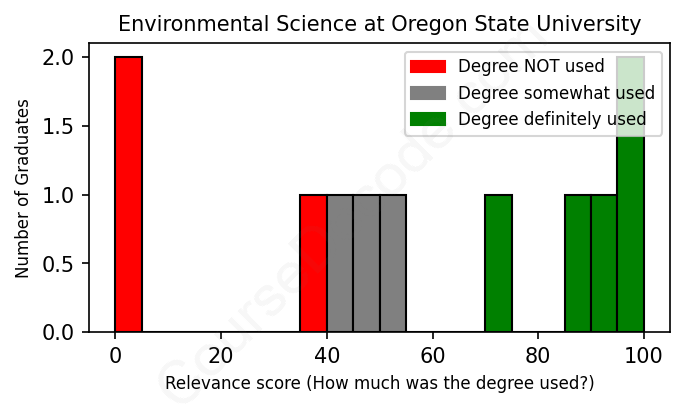
First, some facts. Of the Environmental Science graduates from Oregon State University we've analyzed , here's how many have used (or NOT used) their degree in their career:

These are estimates based on AI analysis of 11 LinkedIn profiles (see below).
The verdict? Significantly below average. Overall, with an average relevance score of 56%, Environmental Science graduates from Oregon State University have a much lower likelihood (-11%) of finding work in this field compared to the average graduate across all fields:
And for comparison, here's the chart for all profiles we've looked at across all degrees.
Also, after graduating, only 18% of these graduates have pursued further education other than another Bachelor's degree (such as a Masters degree or other), compared to the average across all profiles of 35%. This suggests a Bachelors degree is enough for most Environmental Science graduates, and it's normal to look for work straight after graduation.
See the details:
|
Relevance score: 0% We think this person has NOT gone into a career related to their degree. We think this person has NOT gone into a career related to their degree.
DEGREE INFOGraduated in 2012 from Oregon State University with a Bachelor of Science (B.S.) in Environmental Science. No other secondary education since. JOB HISTORY SINCE GRADUATIONSinger St. Thomas More Catholic Church Jul 2012 - Feb 2014 Sales Associate  Lane Bryant Apr 2013 - Present Singer  All Saints Catholic Church Portland, Or Jul 2013 - Present ABOUTNo information provided. |
The top 10 most common jobs done by the graduates we've analyzed (ranked most common to least) are:
When looking at the jobs held by graduates from Oregon State University's Environmental Science program, it's clear that there’s a mix of roles in various sectors. Some of the most common positions include Environmental Planner, Wildlife Biologist, Geographic Information Systems Analyst, and various internships with organizations like the U.S. Forest Service. Many of these positions are directly related to the core concepts taught in Environmental Science, involving hands-on work in conservation, environmental management, and ecological research. For instance, jobs like the Pathways Biological Science Intern and Environmental Aide entail applying knowledge learned in their degree in real-world contexts, showcasing how education translates into practical work.
However, not every job aligned with their degree. Some graduates found themselves in unrelated fields like administrative roles, sales, or even technical positions that don’t require environmental expertise. This variation indicates that while many graduates do secure relevant jobs, there are also quite a few who take positions where their Environmental Science background isn't fully utilized. So, while it’s clear that many do work in areas that benefit from their degree, there’s also a notable number who venture into completely unrelated fields for various reasons. Ultimately, the landscape is diverse, and while many graduates find ways to apply their education, others explore different paths altogether.
Here is a visual representation of the most common words in job titles for Environmental Science graduates (this is across all Environmental Science graduates we've analyzed, not just those who went to Oregon State University):

Looking at the career trajectories of Oregon State University graduates in Environmental Science, it seems like a mixed bag. For many, the first job they land after graduation often leans towards roles that may not be directly related to environmental science, like administrative positions or sales associates. However, others jump right into more relevant roles such as environmental planners, GIS analysts, or positions at organizations like the U.S. Forest Service. It’s interesting to see that even those who start in unrelated fields often find their way back into environmental roles later on, especially when they accumulate experience or intern with conservation organizations.
Fast forward five to ten years later, there’s a noticeable shift. Many of the early career roles evolve into solid positions within the environmental sector, such as consultants, environmental scientists, and safety managers. For those who may have wandered off into unrelated fields initially, it seems like a significant number eventually pivot back towards careers that align more closely with their Environmental Science degree. Overall, while some graduates do end up in jobs not directly relevant to their studies, many manage to carve out successful and fulfilling careers in the environmental field over time. So, if you're passionate about environmental science, there's definitely a pathway for you, even if it takes some unexpected turns along the way!
Honestly, the Bachelor degree in Environmental Science at Oregon State University is kind of challenging, but not in a way that’s totally unmanageable. You’re diving into a mix of science, policy, and sustainability, which means you’ll have to get cozy with subjects like biology, chemistry, and geology, along with a hefty dose of fieldwork and projects. Some students might find the workload to be a bit intense, especially when it comes to hands-on labs and research, but if you’re passionate about the environment, it can really be rewarding. Overall, it's not the easiest degree out there, but if you stay organized and engaged, you'll probably do just fine!
Most commonly, in the LinkedIn profiles we've looked at, it takes people 5 years to finish a Bachelor degree in Environmental Science.
Looking at the jobs held by these Oregon State University Environmental Science grads, it seems like their earnings can vary quite a bit. Some of the earlier graduates stick to more administrative or sales roles, which typically aren't the highest-paying gigs, but they might be getting some stability, like the Administrative Assistant who's been at NuScale Power since 2014. Others have moved into more specialized roles in environmental science and planning, suggesting they could be pulling in decent salaries, especially in state government positions. The recent grads, though still in the early stages of their careers, are just starting out in their respective fields, with some taking on internships and lower-level positions. Overall, it looks like some are doing okay in terms of money, but others may be earning less than what one might expect for a degree in environmental science. It really depends on where they land and how quickly they advance!
Here is a visual representation of the most common words seen in the "about" section of LinkedIn profiles who have a Bachelor degree in Environmental Science (this is across all Environmental Science graduates we've analyzed, not just those who went to Oregon State University). This may or may not be useful:

Here are all colleges offering a Bachelor degree in Environmental Science (ordered by the average relevance score of their Environmental Science graduates, best to worst) where we have analyzed at least 10 of their graduates:
| College | Score | Count |
|---|---|---|
 University of North Carolina at Chapel Hill University of North Carolina at Chapel Hill
|
87 | 10 |
 The Ohio State University The Ohio State University
|
85 | 12 |
 University of Vermont University of Vermont
|
68 | 13 |
 University of Oregon University of Oregon
|
66 | 10 |
 Western Washington University Western Washington University
|
63 | 14 |
 University of Virginia University of Virginia
|
57 | 15 |
 Oregon State University Oregon State University
|
56 | 11 |
 Loyola University Chicago Loyola University Chicago
|
56 | 11 |
 Southern New Hampshire University Southern New Hampshire University
|
53 | 15 |
 University of Phoenix University of Phoenix
|
46 | 15 |
 Florida State University Florida State University
|
45 | 16 |